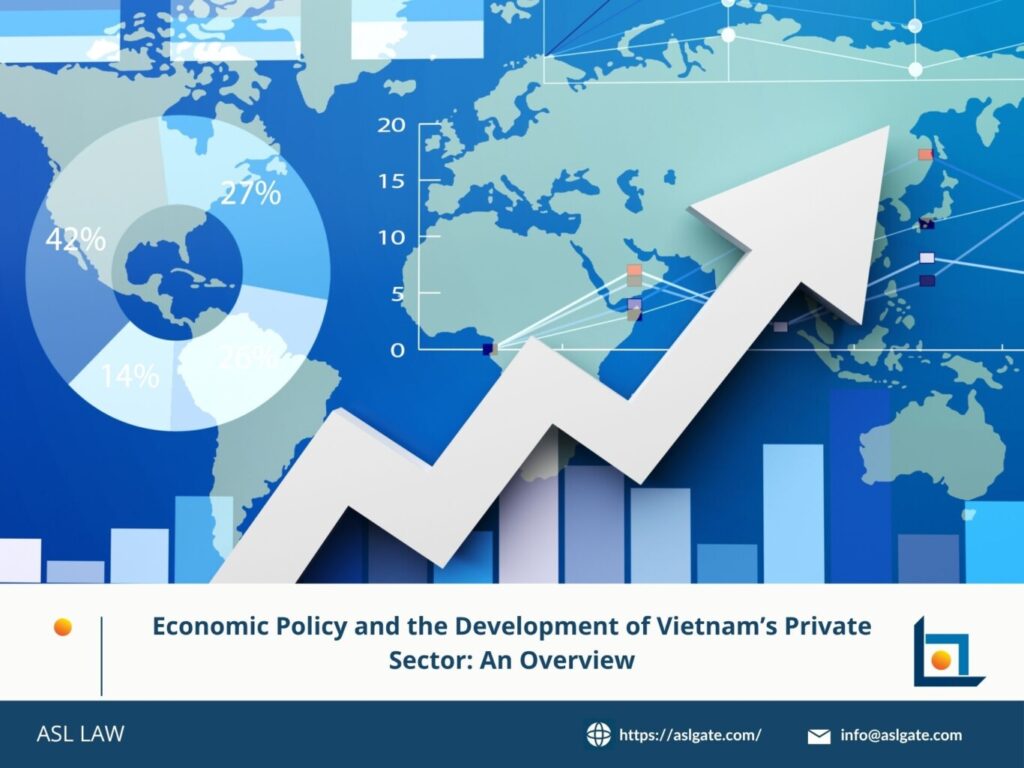In its economic development journey, Vietnam has undergone significant transitions—from a centrally planned economy to a socialist-oriented market economy. In this process, the private sector has increasingly played a pivotal role in the national economic structure.
1. Evolution of Economic Policy Over the Years
- Pre-1986: Vietnam’s economy operated under a centrally planned and subsidized model.
- 1986–1990: Economic reforms began with the Đổi Mới policy in 1986. Landmark legislation such as the Ordinance on Banks, Credit Cooperatives, and Financial Companies, and the Private Enterprise Law in 1990 marked a legal turning point for private sector development.
- 1991–2000: This period witnessed major legal reforms to encourage private enterprise, including the Domestic Investment Promotion Law (1994), the Commercial Law (1997), and the Enterprise Law (1999).
- 2001–2010: Significant resolutions were introduced, such as Resolution No. 10-NQ/TW (2001) on socio-economic and national defense tasks in the capital and Resolution No. 14-NQ/TW encouraging the private sector.
- 2011–Present: Resolutions such as No. 10-NQ/TW (2017), with targets through 2030, and No. 68-NQ/TW (2025) have reaffirmed the central role of the private sector, with the vision of forming large-scale private enterprises and fostering fast and sustainable private sector growth by 2045.
2. Economic Structure by Sector (2022)
Among a total of 735,455 enterprises:
- Private enterprises dominate with 710,664 enterprises (96.6%).
- Foreign-invested enterprises (FIEs): 22,930 enterprises.
- State-owned enterprises (SOEs): only 1,861 enterprises.
- In addition, over 5 million household businesses remain a key economic force.
3. Capital Scale of Private Enterprises
Private enterprises vary in capital scale, but are mostly small-sized:
- 392,000 enterprises with capital from VND 1 to under 10 billion.
- 157,000 enterprises with capital from VND 10 to under 50 billion.
- 106,000 enterprises with capital under VND 1 billion.
- Very few enterprises have capital exceeding VND 50 billion.
This highlights the prevalence of small and medium-sized private businesses, which limits their competitiveness and capacity for large-scale investment.
4. Contribution of Private Enterprises to GDP
- 2000–2010: The contributions from private enterprises, SOEs, and FIEs remained relatively balanced, with private enterprises holding the largest share, SOEs close behind, and FIEs contributing a stable but smaller portion, showing a slight upward trend.
- 2010–2022: The private sector maintained a stable contribution to GDP, ranging from 43–45%, consistently higher than FIEs and SOEs. However, the SOE share declined to around 27–30%, roughly 10% lower than in the previous decade.
- Post-2020 (after the Enterprise Law 2020 took effect): The private sector has expanded rapidly, surpassing 50% in GDP contribution, while SOEs and FIEs now contribute nearly equally at around 20–21%, reflecting a significant decline in the state sector’s economic role.
5. Growth Over Time
Compared to the year 2000, by 2022:
- The number of private enterprises has surged, accounting for 96.63% of all businesses.
- Employment in the private sector reached 59.2%, underscoring its critical role in job creation.
- In terms of business capital, the private sector represents 59.38%, indicating a growing mobilization of resources.
6. Vietnamese Private Enterprises in the Region
According to the Fortune Southeast Asia 2024 ranking:
- Vietnam has 70 enterprises in the list of Southeast Asia’s 500 largest companies—second highest in the region, after Thailand.
- Notable names include Vingroup, Masan, Hòa Phát, Techcombank, Viettel, and Thaco.
- This is a positive sign, showing that Vietnamese private enterprises are gradually asserting a regional presence.
Policy for Private Sector Development in Vietnam
The private sector is increasingly becoming the backbone of Vietnam’s economy. However, the greatest challenge remains the small scale of most enterprises, with limited competitiveness and restricted access to finance and technology.
To address this, Vietnam needs to proactively:
- Enhance financial and credit policy support for private enterprises.
- Accelerate administrative reform and improve the business environment.
- Encourage investment in R&D and digital transformation by private companies.
- Promote the formation of large-scale private enterprises capable of competing regionally and globally.
(Data referenced from VnExpress)
ASL Law is a leading full-service and independent Vietnamese law firm made up of experienced and talented lawyers. ASL Law is ranked as the top tier Law Firm in Vietnam by Legal500, Asia Law, WTR, and Asia Business Law Journal. Based in both Hanoi and Ho Chi Minh City in Vietnam, the firm’s main purpose is to provide the most practical, efficient and lawful advice to its domestic and international clients. If we can be of assistance, please email to [email protected].
ASL LAW is the top-tier Vietnam law firm for doing business in Vietnam. If you need any advice, please contact us for further information or collaboration.

 Tiếng Việt
Tiếng Việt 中文 (中国)
中文 (中国) 日本語
日本語

